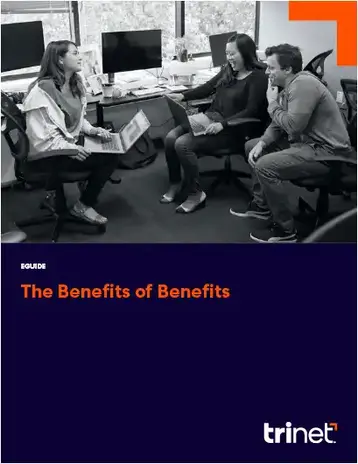
A dependent care FSA may be better for employees who can access it because of the pre-tax deductions which can help reduce the employees' income, Social Security, and Medicare taxes. Plus, it may save other types of taxes.
The dependent care tax credit can be a good option for those who can’t access a dependent care FSA through an employer, which may include part-time employees or union members. In some cases, an employee can use both a dependent care FSA and dependent care tax credits.
Check with your health insurance broker or reach out to TriNet, for more information on broker or access to benefits.
The Basics of Dependent Care FSA
A dependent care flexible spending account (DCFSA or dependent care FSA) is an account where you can deposit pre-tax dollars. The funds in the account can be used to pay for qualified expenses for childcare for children under the age of 13 or for the care of an adult relative or spouse who lives in your home and is not capable of self-care. The IRS has specific rules regarding the use of dependent care flexible spending accounts, and it would be a good idea to familiarize yourself with them before opening an account. These are usually out-of-pocket expenses that you need to pay to take care of your dependents while you are at work, at school or looking for work. Not everyone can get a dependent care FSA. It's only available if your employer offers it to you.
Eligible dependent care expenses include those paid for:
- Care in the home by a babysitter or nanny
- Child or adult daycare outside the home by qualified caregivers
- Preschool or nursery school
- Before and after school care
- Summer day camp
How does dependent care FSA work?
You choose the amount of money that you want to contribute to your DCFSA every pay period. Your employer will withhold the funds from your paycheck and deposit them in your FSA.
You can't use the FSA funds directly to pay for your qualified expenses. Instead, you'll need to pay for them up front, and then submit a claim form to get reimbursed from your FSA account by check or direct deposit into your bank account. You'll need to submit certain types of proof with your claim. You can submit claims online or by using the FSAFEDs app.
You'll need to report your FSA contributions on your federal tax return. You'll also need to renew your enrollment every year if you want to continue using your DCFSA.
The maximum contribution for dependent care FSAs for 2023 is $5,000 for single filers and married couples filing a joint return. The maximum is set at only $2,500 for those who are married and file separately. These maximum amounts have been the same for nearly 35 years.
To be eligible for a dependent care FSA, you must have childcare expenses for a child under 13 or adult care expenses for a spouse or relative who cannot care for themselves while you are at work, at school or looking for work. Is a dependent care FSA worth it?
A dependent care FSA is usually beneficial, if you are able to get it through your employer, because you save on taxes right away. However, there are advantages and disadvantages to an FSA, so you might want to consult a tax advisor.
Dependent care FSA vs tax credit
The child and dependent care tax credit provides a tax credit of up to 35% of qualified expenses. The higher your income, the lower the percentage that you receive as a credit. Ultimately, deciding whether a dependent care FSA or a tax credit is best for you may depend on your eligibility, your income, and other circumstances.
Keep in mind that you may be able to take advantage of both programs. You may be able to use a dependent care FSA and also take tax credits for childcare expenses, as long as you don't use the same dollars for both.
Qualified Dependent Care Expenses
You can use your dependent care FSA funds only for expenses that are "qualified" according to the IRS. Qualified expenses are those that pay for services that are necessary for you and/or your spouse to be able to work. These expenses must meet the IRS's criteria for eligible child and dependent care expenses.
The IRS lists the most common qualified expenses, but the list is not comprehensive. Expenses for other services that are not on the list may also be qualifying. If you have any questions about whether a particular expense qualifies, it's best to consult a tax advisor.
What Happens to Unused Funds in a Dependent Care FSA?
Dependent Care FSAs are generally use-it-or-lose-it plans. That means if you haven't spent all the money in your account by the end of the plan period, then you can't withdraw it as cash and will lose the money. However, there are sometimes exceptions where you can roll over your funds. You also have a grace period, which we'll explain in the next section. Grace periods are not a given and you should check with your provider if your FSA includes this.
Understanding the Grace Period in Dependent Care FSA
Normally, you will forfeit the funds in your dependent care FSA if you don't spend them all on qualified expenses by the end of your plan period. However, you do get a grace period every year, which gives you a second chance to use the funds. The grace period runs for two-and-a-half months, from January 1 to March 15 of each year. During the grace period, if you spend money on qualified dependent care services, you can use the remaining funds in your DCFSA from the previous plan period's balance to pay for them.
The Tax Benefits of Dependent Care FSA
When you have a dependent care FSA, money is taken out of your pay before taxes and deposited into the FSA account. You never have to pay taxes on the money in your DCFSA account. This means that you have more money available to spend on your qualified expenses. For example, if your total tax rate is 25%, for every $100 that you earn, you will receive only $75 in your take-home pay after taxes are deducted. But if that $100 goes into a DCFSA account, you will have the full $100 available for you to spend on child and dependent care expenses. In addition, your tax bill is lowered.
Dependent Care Flexible Savings Accounts with TriNet
If you are an employer who wants to offer your employees a dependent care FSA plan from a trusted provider, a TriNet dependent care FSA is a great choice. Contact our benefits solution center to find out more about how we can help.






